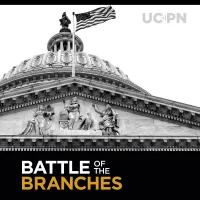Episode Description
When it comes to conflicts and diplomacy abroad: Who holds the reins? That’s one of the big questions I find myself asking as I look at the news about American involvement – whether in Iran, in Ukraine, or throughout American history. What is the scope of the President’s power over war and foreign affairs? Doesn’t the Constitution constrain those powers, or give Congress the ability to constrain those powers? Or have legal constraints proven unworkable or unwise over time? If the President has come to dominate American military and foreign policy, should we have misgivings about that, or accept it?
To try to find out the answers to those questions. I’m here with two of my colleagues at the University of Chicago – Curt Bradley, the Allen M. Singer Distinguished Service Professor of Law, and Austin Carson, an associate professor of political science. Curt is an expert in constitutional law and foreign relations law, the author of casebooks and legal restatements on foreign relations, and has recently published an important book: Historical Gloss and Foreign Affairs: Constitutional Authority in Practice, and is working on a new book on US Sovereignty and federal power in constitutional law. Austin is an expert in secret and intelligence and their relationship to international security and global governance. His first book was Secret Wars, Cover Conflict in International Politics, followed by Secrets in Global Governance: Disclosure Dilemmas and the Challenge of International Cooperation (coauthored with Allison Carnegie), and he’s now working on a third: To Spy on the World: The Infrastructure of Intelligence and America’s Rise to Power.
I’ve brought them here to help me understand how the executive projects American power around the world and what we should think about that.
Have a listen.
